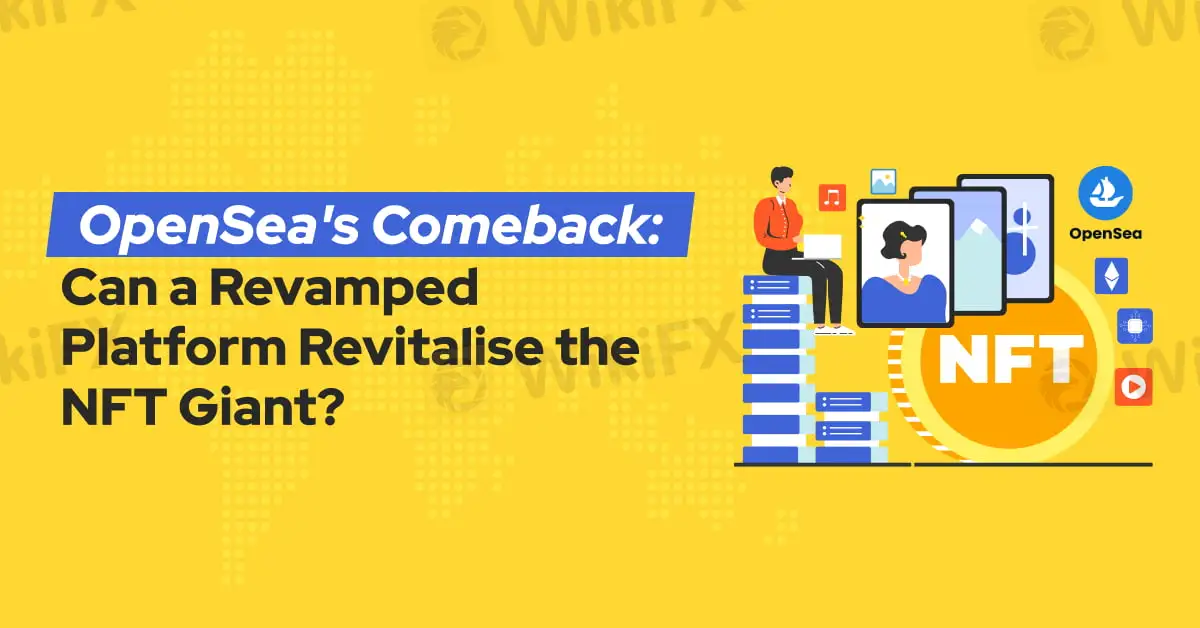OpenSea's Come back: Can a Revamped Platform Revitalise the NFT Giant?
Abstract:OpenSea, once the dominant NFT marketplace, is launching a reimagined platform in December, aiming to reclaim its position in a market experiencing a steep drop in trading volumes.

OpenSea, once the dominant NFT marketplace, is launching a reimagined platform in December, aiming to reclaim its position in a market experiencing a steep drop in trading volumes. CEO Devin Finzer shared a preview of the revamped platform on X, hinting at the significant overhaul, stating that OpenSea has been “quietly cooking… [and] built a new OpenSea from the ground up.” This launch marks the culmination of a nearly year-long restructuring effort, following major layoffs and the start of what Finzer dubbed “OpenSea 2.0.”
In late 2022, OpenSea began losing market dominance to rival platform Blur, which drew traders with its advanced trading tools and token rewards. Blur‘s approach disrupted OpenSea’s traditional buy-and-sell model, attracting NFT traders seeking more sophisticated features. Although OpenSea has regained some market share, the platform has continued to struggle amid an overall downturn, with trading volumes recently hitting their lowest point in more than three years. At the height of early 2023, monthly trading volumes for Ethereum-based NFTs on OpenSea were around $868 million but have since dropped drastically to just $136 million in the last month.

The redesigned platform aims to address these challenges and better align with traders needs by incorporating advanced features and incentives similar to those that helped Blur gain popularity. OpenSea has already opened a waitlist for early access, suggesting that the updated platform could play a critical role in reviving interest in NFT trading.
Adding to its challenges, OpenSea received a Wells notice from the U.S. Securities and Exchange Commission (SEC) nearly two months ago, signaling the agency‘s intent to pursue enforcement actions. According to Finzer, the SEC considers that certain NFTs on OpenSea’s platform may fall under securities regulations. A Wells notice, typically a precursor to formal charges, is issued to notify a company of potential regulatory violations.
In response to the SECs move, Finzer announced that OpenSea would contest the notice. To support the NFT community, OpenSea has committed $5 million to cover legal expenses for NFT creators and developers who may face similar regulatory scrutiny. Finzer expressed concern that regulatory pressure could stifle innovation, stating that “every creator, big or small, should be able to innovate without fear.”
OpenSea‘s receipt of the notice reflects the SEC’s broader initiative to define regulatory boundaries for digital assets like NFTs. In 2023, the SEC targeted other NFT projects, including Impact Theory and Stoner Cats, alleging violations of securities laws. Both cases were settled, yet the SECs actions have fueled uncertainty in the NFT space, prompting hesitation among creators and companies. For instance, DraftKings recently decided to shut down its NFT division, attributing its closure to “recent legal developments.”
In addition to NFT-focused actions, the SEC has ramped up its scrutiny of the crypto industry overall. Earlier this year, the agency issued a Wells notice to Coinbase and began investigating other platforms like Uniswap and Robinhood for potential securities violations. As regulatory pressures mount, OpenSeas relaunch could be a critical moment for the NFT sector as it navigates both market and regulatory challenges.

Read more

Cryptocurrency Money Launderer Sentenced to Over 10 Years for Laundering $20 Million in Criminal Fun
An Indian national exposed laundering $20M via cryptocurrency and Hawala networks, revealing intricate money laundering techniques.

$TRUMP Token Soars: A New Era for Trump and Cryptocurrency?
Donald Trump has taken an unexpected step into the cryptocurrency market ahead of his January 20 inauguration by launching a memecoin named $TRUMP. The announcement sparked significant speculation and trading activity, with the coin’s value skyrocketing within hours of its debut.

Crypto.com’s Dual Front Battle: European Progress and U.S. Regulation
Crypto.com has received conditional approval to operate under the European Union’s Markets in Crypto-Assets (MiCA) framework. Once fully licensed, this will enable the company to serve customers throughout the EU under a standardised set of rules.

Boerse Stuttgart Digital Secures EU-Wide MiCAR Crypto License
Boerse Stuttgart Digital secures Germany’s first MiCA license, enabling EU-wide operations and expanding its digital asset services.
WikiFX Broker
Latest News
Will Gold Prices Continue to Rise Due to Trump’s Tariffs?
Miami Firm Owner Pleads Guilty to $6M Ponzi Scheme Fraud
NBI Cebu Arrests Forex Trader for Illegal Investment Solicitation
PU Prime's "Feather Your Trades" Contest! Begin
eToro Files for IPO with $5 Billion Valuation on NASDAQ
Is FizmoFX a Scam? Fraud and Account Suspension of Traders
IG Japan Extends US Stock CFD Trading Hours in 2025
ALERT! Warning against Livaxxen
Which Zodiac Sign Makes the Best Trader?
BOJ to Announce Policy Decision This Week, Market Bets on a Rate Hike
Rate Calc

